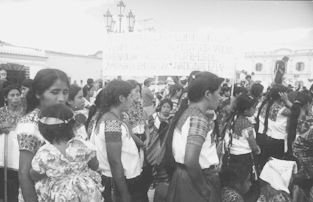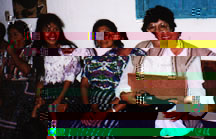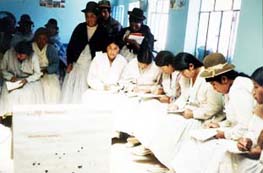

Training Center for Indigenous Self-Development (CECADEPI)
CECADEPI is an Indigenous training center for self-development in Mexico that includes Tzotsil, Tzeltal, and Tojolabal people. They live in an area characterized by poor land conditions compounded with exposure to plagues, diseases and long droughts. CECADEPI organized a series of training workshops to recover soil fertility and improve the quality of the ecosystem ravaged by mono-crop agriculture and indiscriminate use of fertilizers and chemical pesticides.
Chiapas, MexicoWith the support of Abya Yala Fund, CECADEPI was able to promote ecological farming techniques and practices by training forty Indigenous farmers who in turn served as agro-ecological promoters and agro-technicians in their own communities.
The project is helping communities recover their traditional knowledge and promote sustainable agricultural methods. The training program has also raised people's consciousness on the issues of autonomy and self-sufficiency. The following quote from trained promoters reflect the achievements of the program: "Autonomy means to have faith and confidence in our decisions; to take responsibility over all the phases of the project; to make the decisions over the implementation of the project; to stop being passive and convert ourselves into active subjects; to participate, to promote community development, and to implement projects that meet the necessities of the community, not those that are imposed on us."

K'ichin Konojel (Women Together)
In Chimaltenanago, Guatemala, the Mayan organization "Kichin Konojel" implemented a project to raise human rights awareness among Mayan women.
Chimaltenango, GuatemalaWith the assistance of Abya Yala Fund, Kichin Konojel trained 1,900 Mayan women on the specific rights of women, identity issues and the rights of Indigenous communities. The workshop helped raise awareness regarding the education of girls and the role of women. In addition, the project was able to coordinate and organize national conferences around the issues of Indigenous women's rights and education. The project had an enormous impact on people's thinking and the self-esteem of Mayan women participants. Their achievements are best expressed by one of the trained women:
"I thought that voting wasn't important and that only the Ladinos had a role in deciding their own fate. Now we know that we can fight for our rights. We know that we are people with intellectual, physical and spiritual capacity, and although we don't speak the same language, we are just as valuable as the rest. We can expect respect from our husbands and from our community."

Amauta Indigenous Foundation (FIA)
The Fundación Indígena Amauta (FIA), a non-profit institution founded and run by Quechua leaders and professionals that focuses on Indigenous and rural development in Bolivia, introduced a viable alternative to strengthen both the nutritional security and socio-economic development of five Quechua communities of Pampahuasi.
Pampahuasi Region, BoliviaThe Pampahuasi region of Bolivia is a very mountainous area with gorges and abundant water, and is rich in culture and biodiversity. Tragically, the region has a poor education system, widespread illiteracy and has suffered terrible deterioration of its land productivity, which has further exacerbated poverty.
With the support of Abya Yala Fund, they were able to rescue and revive traditional agricultural practices and endangered Indigenous plants of high nutritional value, improve an hydraulic grain mill, hold community workshops covering organic agriculture, nutrition and health, gender and development, human rights and law, administration, and basic accounting, establish a women-run bakery, and organize a community fair about native and nutritional food. A total of 189 families were directly benefited.
Return to living traditions
English Home